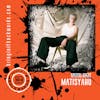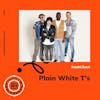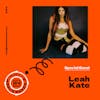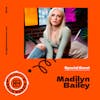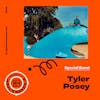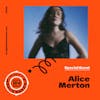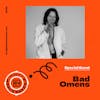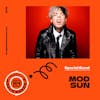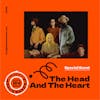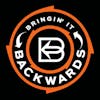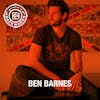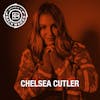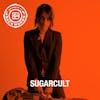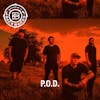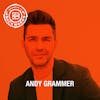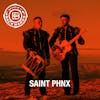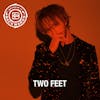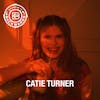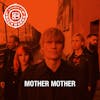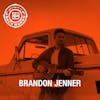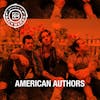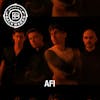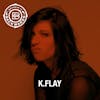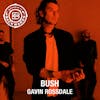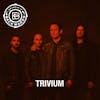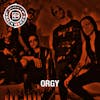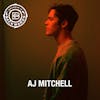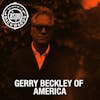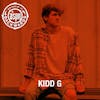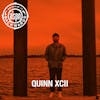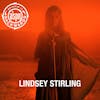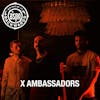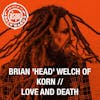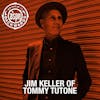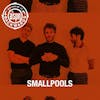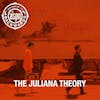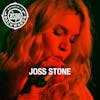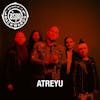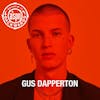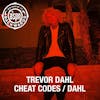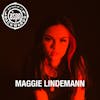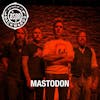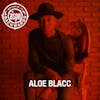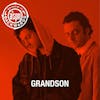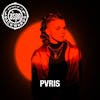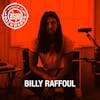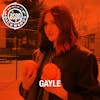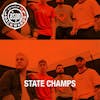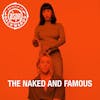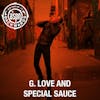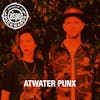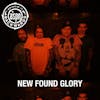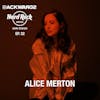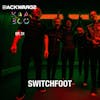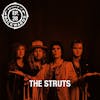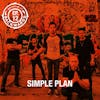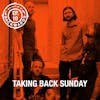Interview with The Wrecks (The Wrecks Return!)
We had the pleasure of interviewing The Wrecks over Zoom video.
The Dictionary of Obscure Sorrows by John Koenig which defines made up words for indescribable emotions classifies the neologism “sonder” as the “profound feeling of realizing that...
We had the pleasure of interviewing The Wrecks over Zoom video.
The Dictionary of Obscure Sorrows by John Koenig which defines made up words for indescribable emotions classifies the neologism “sonder” as the “profound feeling of realizing that everyone, including strangers passing in the street, has a life as complex as one’s own." The Wreck's vocalist/producer Nick Anderson landed on "Sonder" as the title of their sophomore album, which is out now via Big Noise Music Group.
The band’s most recent singles, the sparkling post-breakup anthem “Lone Survivor” and liberating alt-rock track “I Love This Part,” showcase that they’ve fully honed-in on and embraced their characteristic genre bending alt-rock, as well as having evolved and matured their sounds for this triumphal venture of a second album. Anderson says that experimenting with minor keys and calculated lyrics.
On Sonder, there’s not only their distinctive witty, frantic genre-bending tracks (“Sonder,” “Don’t Be Scared,” “Unholy,” “Ugly Side”), but also their take on mesmerizing alt-rock love/loss ballads (“Where Are You Now?,” “Dystopia,” “Unrequited,” “No Place I’d Rather Be,” “Normal”).
Sonder follows the release of the band’s 2016 debut EP We Are The Wrecks (their first single “Favorite Liar” currently has 36 million+ streams on Spotify), their 2018 Panic Vertigo EP, their 2020 Static EP as well as their 2020 debut LP Infinitely Ordinary (58 million+ streams on Spotify).
The Wrecks continue to rack up the massive fan base that has already given their top five singles on Spotify over 80 million listens. Poised for a wide-open road ahead of them, Nick Anderson and The Wrecks continue to charge into the limelight. Not too shabby for a kid from Wellsville, just two hours south of nowhere.
The Wrecks begun as vocalist/producer Nick Anderson’s sole endeavor and has since been rounded out by Aaron Kelley (bass), Nick “Schmizz” Schmidt (guitar) and Billy Nally (drums). The Wrecks also collaborated on a select number of tracks off Sonder with producers Westen Weiss (Meek Mill, Camila Cabello, Post Malone) and Dillon Deskin (Flo Rida, Will Sparks, Different Heaven, Myrne) to expand their sound.
We want to hear from you! Please email Tera@BringinitBackwards.com.
www.BringinitBackwards.com
#podcast #interview #bringinbackpod #TheWrecks #Sonder #WeAreTheWrecks #NewMusic #zoom
Listen & Subscribe to BiB
https://www.bringinitbackwards.com/follow/
Follow our podcast on Instagram and Twitter!
https://www.facebook.com/groups/bringinbackpod
We'd love to see you join our BiB Facebook Group.
What's going on!? It is Adam. Welcome back to bringing it backwards. A podcast where both legendary and rising artists tell their own personal stories of how they achieve stardom. On this episode, we had a chance to catch up with Nick, Billy shmoes and Erin of the Rex over zoom video. Last time we talked to the Rex was June, 2020, and they had just put out infinitely ordinary. They had just put that record out. So if you watch that first interview, they're talking about that record coming out and then maybe, you know, re-releasing a dude to touring schedules and everything else because they weren't allowed to tour at that point. But we got a new EAP between then and now. 3 (2m 7s): So they tell us about the static EAP and all about their brand new record. So last time we chatted, they had just released, like I said, infinitely ordinary. About six months later, they put out the static EAP and now they have a new new record called Saunder and they tell us all about that album as well. They wrote and recorded a majority of the album in Nick's room, in his studio. So they talked to us about that, a little, a writing camp. They put together at their labels studio and all about the full us headline tour that they're doing as well. You can watch the interview with the racks on our Facebook page and YouTube channel at bringing it backwards. It would be awesome if you subscribe to our channel like us on Facebook and follow us on Instagram, Twitter, and tick-tock at bringing back pod. 3 (2m 55s): And if you're listening to this on Spotify, apple music, Google podcasts, it would be amazing if you follow us there as well, and hook us up with a five star review. 4 (3m 6s): We'd appreciate your support. If you follow and subscribe to our podcasts, wherever you listen to podcasts, 3 (3m 12s): We're bringing it backwards with the Rex. 5 (3m 15s): Hey, what's going on? 3 (3m 16s): Hey, what's up, man? How are you? 5 (3m 18s): Good. Sorry that we're running late. 3 (3m 21s): It's all good. It's all good. 5 (3m 24s): Well, I was like, you guys want to be in a zoom interview and they're like, I mean, yeah, 3 (3m 30s): Rad. We I've interviewed you guys about, it was like two years ago. I don't know if you remember it was you hadn't you were about to put out your record in or maybe it just put it out. I can't remember. It was funny though. Cause you said I would just rewatched it and you're like, this is the first time I've used zoom. So I'm sure you've got a bunch of times since then. 5 (3m 50s): Oh my God. Yeah. W w was it all of us? 3 (3m 54s): Yeah, but you're all in different spots. 5 (3m 57s): Oh my gosh. That was probably chaotic. It sounds like. 6 (3m 59s): I think I do remember that in Santa Monica, like chilling on that. 3 (4m 3s): Yeah. I'm trying to remember. Yeah, everybody was all over the place. And your room was red Nick. Your whole year. Your red, your room was all like red lit. 5 (4m 11s): Oh yeah. Today. It's just, there's just, the blinds are open. That's the lighting today. 3 (4m 17s): It's all good. I appreciate y'all doing this. Thank you so much. 5 (4m 21s): Yeah, of course. Thanks for having us. 3 (4m 23s): Yeah. Awesome. So I'm Adam, and this is about you guys and your, your journey in music. We, we kind of already went through your guys' stories in the first interview, but I'd love to like kind of recap that and then catch up on what you guys have going on, especially with the new record and, and what you've done since the last time we chatted. 5 (4m 44s): Oh man. Well, we, this crazy thing happened. It's global pandemic. 3 (4m 53s): Oh no, no. We were chatting during the goal of pandemic. 5 (4m 57s): Oh, I would have been. Yeah. Cause, cause the, yeah, the record came out like may 3 (5m 1s): Yeah, you guys were, you had the record done. Cause it was June of 2020 when I talked to you guys and, and you told me that you had, cause you were like to put the record out and then you were going to add some songs maybe, and then rerelease it, but it looks like you put together and you put out an EPF it's back. 5 (5m 20s): Yeah. Yeah. Oh my gosh. It's so hard to remember the timeline of last year's 6 (5m 25s): Like what's new is we, I think we've grown unknowingly almost. I mean, we knew about it, but we did like a two week tour. I think it was last, was it August of 2021, right? Yeah. And really got us all stoked again on this tour that we're about to get on for this new record, new driver. And we did the driver a tour, but I mean, I think we're all just like recharged and 5 (5m 49s): Yeah. We've been touring all that. Yeah we did. We, we finally got to tour, as soon as we were allowed to tour, we started touring again. We've been touring basically our whole career. So that's definitely an important factor for us and yeah, we put out that EAP and then we put out like a couple of covers. We did a bunch of live streams and I'm just, yeah. I struggled to write new music for a while there. So like there wasn't a ton of stuff coming down the pipeline. So we're lucky to be putting on a new record this year. 3 (6m 17s): Yeah. I just, I just had a chance to check it out. It's it's a really, really good. It's really good. Yeah. I was curious, well, I just want to go back a little bit. So Nick you're from originally from New York and then you ended up meeting Aaron like online or something. Is that kinda how that worked out? 5 (6m 35s): Yeah. I saw his find his band on Facebook. He was, his band was opening for a band that I liked and they must have tagged the band that I had followed. It was like 2010, 2009. And I was like, wait a minute. How is this band playing a show with the band? I like, and we've got the same amount of Facebook likes on our page, 3 (6m 55s): Every saying that 5 (6m 57s): Possible. And so, I mean, I asked him, so then I DMD Erin. 7 (7m 2s): And if I somehow liked this kid and we stayed in contact and 5 (7m 8s): Tell me how you got that show. I was like, oh, I must be doing something wrong. I got to ask this guy for advice on how he, how he, how he got 7 (7m 16s): His it 5 (7m 16s): College show. And you booked the 7 (7m 18s): Show. You believe this, but that's not true. 3 (7m 20s): I don't know. That's 7 (7m 22s): Your own band on the bill? 5 (7m 23s): I'm pretty sure he put his own band on the bill for the, for, is that not the truth? Well, whatever. That's what I've been saying for years. And he did book the shows that college, but apparently, apparently that show, he didn't book. What conflict of interest at all. 3 (7m 38s): Okay. Where were you living in New York? Sail at the time Nick. 5 (7m 41s): What's that? 3 (7m 41s): Were you still living in New York at that time or had 5 (7m 43s): You moved? I was in high school. I was a freshman in high school. 3 (7m 46s): Oh, okay. Wow. And where were you living then? Nick? I mean, Aaron. Where were you living? 7 (7m 50s): I was in Wisconsin. 3 (7m 51s): Okay. So you're going to school there and that's where he S he saw your band page or whatever? 7 (7m 56s): Nope. Cool. Claire, Wisconsin. 3 (7m 58s): Okay. And then when did you guys that you ended up meeting each other? Cause I know Nick or the other guys knew in high school. And then you told me a story about how like you dated a friend or something. So I want to go there, but I'm just curious. When did Nick, when did you and Aaron actually meet in person for the first time? 5 (8m 18s): Years later? He, I mean, he ended up just becoming like a really close friend and supporter of my music when I was in high school, in a town that was very bullyish and not very nice and didn't support the stuff I was doing at first. Like there's a lot of, 7 (8m 32s): Yeah, we both grew up in like the same kind of town. 3 (8m 36s): Yeah. Okay. 5 (8m 37s): And so he was like this older kid who was like really nice to me and like my stuff and his friends looked really cool and he had other people who had similar interests and I didn't, so it was like, I was jealous from afar. And so, yeah, so we just kind of clicked on that and then it wasn't until years later that Aaron introduced me to who would then be our later manager, because he started interning for them that we've met in person. We met in person when I was there in California visiting. 3 (9m 7s): Wow. So that was the first time you, but you'd stayed in contact for all those years. 5 (9m 11s): Yeah. Yeah. 3 (9m 12s): That's crazy. Wow. Okay. And then I remember Billy, you, an instrument is met because you went to the same high school or did you go to the same school or something like that? 6 (9m 19s): I mean, me and Billy, we both played in like local bands growing up and then, and then we ended up getting like an audio recording school together. And I mean like long story short, we became like friends through that. And I went on a tour with another artist that was on our former management, which is like what brought us all together, really in the first place. So then, I mean, Billy had already known Nick and Aaron briefly from the years before. Cause he had been working with Richard, our old manager. I pretty much met those guys once on that tour. And I was just playing bass for this kid play Burrell. And then after that it was a very impulsive, like, Hey mama, moving to LA in two weeks after sending an audition, recording of a risk that I wrote and a hilarious video in my bedroom. 3 (10m 7s): Yeah. I remember that. Yeah. You told me that story that you got, that you send in video of you, like, you know, rocking on your room or something and playing guitar and in the, in a riff that ended up going within and joining that band. But Nick, you were in San Diego right in the re originally or you moved? 5 (10m 23s): I was, I was in San Diego for a minute and that's when I, I originally met. Billy was because I was, I was in San Diego taking like train trips up to right on the weekends. I don't really, it wasn't one of those, one of the Hughes there, one of those weekends with the band that he's putting together. 3 (10m 39s): Okay. I'm curious because, well I'm from San Diego and you said you went to, I think city college right in San Diego city. Yeah. And so did you 5 (10m 47s): Do CCC? Yeah. 3 (10m 48s): Yeah. Right there in the middle of downtown. Did you like, did you go to San Diego just to go to college? I never asked you that before. Like how did you end up landing in San Diego from the east coast? 5 (11m 0s): It's it's embarrassing really? Because where, where I grow up, where I grew up it's there's I just thought I had to go to the west coast to pursue music. Like if I, there was a beach there, there was probably opportunity. I didn't really know the difference between San Diego and LA. And I was just like, I went, it was kind of a D it was a vehicle to get out there to do music, but I masked it to my parents is like, oh, I'm going to go to school. Like, you know, for my mom. And then my dad was like, I want to play on the baseball team and the city, you know, this school has, has all that. So I can. And so I went out there and I was doing all those things while I was doing music on the side. And I ended up dropping out of school, like putting the team and dropping out of school so I could just do music. 5 (11m 44s): But yeah. So I was in San Diego just by like, because a buddy of mine's brother is in the Navy and they're like, he was stationed there. So like, that's why, like, it 3 (11m 54s): Was okay 5 (11m 57s): Because I knew one person there, like that was, I knew zero people in LA. 3 (12m 1s): So you knew one person? Yeah. One person in San Diego. And then you ended up playing baseball for city colleges team. Yeah. Wow. Yeah. I was dude. I did some like, just Googled deep diving on you guys. Just cause I had time today and I found some videos, a video. You've your old band. You guys did like a 21 pilots cover and stuff. That was pretty funny. But then I found a baseball video of you and you guys won some like championship thing 5 (12m 26s): Probably. Yeah. 3 (12m 30s): I think he even got, you get interviewed by like the, the NOCO news guy and he's got like his headphones. I'm sure you guys remember. 5 (12m 38s): I'm not sure which one that is. 3 (12m 40s): I don't know. You were in orange uniform. A 5 (12m 42s): Lot of games. 3 (12m 44s): He won some championships. I was like, damn. So he's actually really good. So then you ended up planning to walk onto the team. I mean, at San Diego city college, even though it's a city college that I think the team's pretty good. 5 (12m 56s): Yeah. No, they were pretty first. No, I'm not going to lie. I got, I was like, I got like the ACE slot. Like I was the number one pitcher in the fall ball season, then going into the spring, which is your real season. I D I quit the coach. I called the coach to Tom and he was livid. I was like, dude, you don't even have a coach anymore. I'm calling you to tell you, I'm never going to talk to you again. Basically yelling at me like I'm in trouble. So is a big opportunity to invest a lot of time and energy into you. I'm like, dude, you gotta, you gotta widen your scope. My God, this is insane. But you're saying to me right now, 6 (13m 27s): Sports for one season and middle school wrestling, my coach loved me so much. Now I told him I was quitting, work on music and suddenly like biggest mistake you're ever going to make. <inaudible> a time after school to rehearse with my band. And I was like, fucking 13. Excuse me, 11. 3 (13m 49s): Yeah, you can swear all you want. 6 (13m 54s): There's been a big mistake. And this was actually half of the track season. Cause you made me attractive. Stay in shape for wrestling next year and hurdles. I'm like, I don't do. 5 (14m 4s): How have you never told us that story? Your middle school wrestling coach wouldn't quit to pursue. Music said this is the biggest mistake ever 6 (14m 10s): Was just saying like you told me I'm making a big list. I don't know if he said the biggest, 5 (14m 14s): Well, the way you worded it, the first time made me cry, laughing. So maybe the first one, 3 (14m 18s): Meanwhile, he's still probably the wrestling coach at that. 5 (14m 23s): He's like drinking a glass of scotch, watch a videos of you on YouTube. He could have been an Olympic wrestler. He blew it. Look at him, fucking tiny ban. He could've have been massive. 3 (14m 36s): Was there like something that like, did you get a gig or something? Like, how did you decide on just stopping playing baseball? I guess is my question 5 (14m 46s): I was spending, I was spending like every night in my room, on my computer, like making demos and I want it to be writing more. And I was just so tired at the end of practice and at the end, trying to do homework and trying to like keep up with school and do a sport, which is like, it felt like two full-time jobs. And, and, and I just, I don't know. I just, I didn't have time. And so I kept, I kept trying to make it work. And then at some point I was just like, I, I need to, I need to either commit fully to this. Like I just felt myself in a weird limbo and I not comfortable in a place like that. 5 (15m 28s): I was like, I need to, I need to commit fully to, to the music. It wasn't ever like, oh, I got to pick between one or the other. It was like, if I have to pick, I'm just going to go with music. And I felt like I was the moment I had to pick. I will say I got to go through high school, doing all the things I wanted to play in all the sports and doing music. And it was just fun. But here I was out on my own didn't know, like really anyone and I, wasn't making a ton of friends at this school and my roommates sucked and I was just like, this is a, this is a moment I got to just make a decision here. And so I just, yeah, I just decided to, I was spending too much time on the baseball field and not enough time in my room making demos. And then I, so then I went back to school for that second semester in the spring while my roommates continued playing baseball and they went, I think, oh, and 19, it was awesome. 5 (16m 14s): They didn't want a single yet. And then, and then I decided I was spending too much time in the classroom and not enough time making demos. So I dropped out of school. 3 (16m 25s): Okay. And were you playing in abandoned San Diego too? 5 (16m 28s): Yeah. Aaron and I were playing, maybe not while I was in college. It was right after, right after college. So during that time I was, I was looking for members for my pop punk band coast bound I had, and then recorded in epi at that point, but I had no members. And so I was like, like if Aaron was in California at the time, he probably would have joined the band, but he was not there at that time. So I would like, in my classes, I was like, I had a couple of music classes and anyone would like a pop punk shirt or were poor Jason's shirt or like long hair. I was like, Hey, do you play music? Like, but I'd like to think that I was just sociable and going up to everyone, but it would probably take me three classes to gain the courage, to say hi to anyone. 5 (17m 12s): But eventually I, I, I found a, I found a guitarist and then my other buddy who on the baseball team, he played guitar and he might've joined. And like, so then it started kind of happening. And, and then by the time I dropped out of school, Aaron was able to, Aaron was in California and able to join the band and we were able to do it while he was in Los Angeles and I was in San Diego and we just would get together. And we, we kind of solidified the lineup and started playing in the San Diego pop punk scene. 3 (17m 42s): Okay. So where you put like someone, those type of venue, like where did you play in San Diego? 5 (17m 47s): We are in the D I Y scene. Yeah. We played like, like a, like a strip mall storefronts. And we played like, like garages and random like donation, like, like outside venue, things like it was all really cool. 3 (18m 1s): That's cool. 5 (18m 1s): Yeah. There was a healthy scene. There was like a lot of bands. It was a lot of the repeat bands and a lot of the same fans. And I didn't even realize we were playing in a music scene until years later I look back and like, dude, that was like one of the last DIY like scenes that like I have seen, you know, 3 (18m 15s): San Diego had a really good scene for a while there. I mean, 5 (18m 20s): Part of it. Yeah. 3 (18m 20s): Yeah. And there was a lot of bands that were getting signed out of the, that's kind of in that like warp tour days. I mean those early 2000 days, there's a lot of bands coming out of San Diego. 5 (18m 32s): Yeah, for sure. And there was definitely like an energy of them keeping it alive and we only played like maybe 10 shows probably less, but it was cool to like just kind of step our foot in it and like experience it and be so welcomed into it. Yeah. It was, it was really awesome vibe. 3 (18m 49s): That's awesome. And then you guys, you and Aaron ended up starting the racks and the other, and then Billy, you joined and then I think you said you had a guitar player even before shmoes joined again, Ray, isn't that going to happen? 5 (19m 2s): Schmitz joined right from the get go. But we had a fifth member that was like, 3 (19m 7s): Yeah. Okay. 6 (19m 8s): It wasn't there. Wasn't the story that there was someone, 5 (19m 11s): Oh shit. There was a drummer to call Cogan. We just, we just auditioned to people and we were like, well, let's do it. And then we like, within that same week, we like where the instruments were available. And so we just put it that way. Yeah. 3 (19m 27s): And at that point, sorry, go ahead. 8 (19m 30s): At Aaron, Aaron got a phone call like four years later. So like, are you guys still auditioning? 5 (19m 35s): Oh yeah. I got a call like two years ago about some sort of fly on a guitar center that was never taken down. 7 (19m 45s): It was still around. We were on tour too. And he's like, Hey man, you guys still looking for a guitarist? I'm like, no, bro right now. 3 (19m 54s): Oh man, that is crazy. Did you guys know it was going to be the project was the racks and when this was all happening, when you were reaching out to Billy and Chavez, 5 (20m 4s): We, by the time we reached out to them, I had like the first EAP basically demoed out. 3 (20m 10s): Oh 5 (20m 10s): Wow. And then I was like, these are the songs. Like, what do you think? And like a few other like, like random little rock things. And that was like, w I had like the, the nugget of the, the idea was already there. Yeah. 3 (20m 23s): Okay. And I remember you guys saying that the first man, I don't know if the person's still managed as your, I think you said his name was Richard. Last time I talked to you, what, how that's kind of the, he was kind of the guy that pulled the whole band almost together. Right. 5 (20m 36s): So he knew because Aaron and turned for them and I 3 (20m 39s): That's what it was, Aaron entered for them and then okay. That's and then he knew that's how 5 (20m 43s): Me to him and got 3 (20m 44s): It. 5 (20m 45s): I started writing for his bands. And so then I met Billy and then I needed a drummer and I was like, that kid was 16. When I met him, I was like, can you put me in contact with him? So Billy was available and Billy said, cool. Yeah, I'm done. But I've also got my buddy SREs here. Can he come? And I said, no, I've already got a guitar as we're good. And then he goes, and then Richard said, have him send in like an audition video, like have them play. And so, so Richard was facilitated and was like, you know, obviously part of it and was helping, helping me be like, is this guy good or not? Is he, you know, but I mean, I met Aaron organically and met Billy through, through those writing trips and stuff, 3 (21m 22s): But 5 (21m 22s): I wasn't really, I picked out like I picked, well, the universe picked Aaron and I, and then I met Billy and yeah. So it was like, it wasn't quite put together in that sense. That's funny. 3 (21m 38s): Well, I remember you saying, I mean, you guys have some pretty, pretty insane stories when it comes to almost like all the recordings that we talked to you prior to the, the newer ones, obviously with the first DP and, you know, using this studio that you guys didn't even realize you were using, not really, you know, you weren't really let to, you know, do it or whatever. And you had to send somebody in there to get the, the tracks transferred over. And then even the next thing you guys put out with a panic vertigo, wasn't that like a whole thing where they put a producer together with you and it didn't work out. And you ended up going to some barn that you knew, like a buddy of yours to record the rest of it. 5 (22m 18s): Yeah. Yeah. Essentially. I mean, it was a studio that just happened to be in a building the shape of a barn. But 3 (22m 23s): Yeah, you went to a studio there. 5 (22m 25s): We did say that. Of course we were like in the 6 (22m 27s): Garage, but spiders and crickets every night. 5 (22m 29s): Oh, that's true. For sure. If only your bed was made of hay bells. 3 (22m 34s): Okay. So when it came into then infinitely ordinary, how was that record put together? I think you said it was similar to that second AP, right? 5 (22m 44s): No, no. This one was this one. Well, we did two of the songs we did record back at that place. 3 (22m 50s): Right. You did like that, that you said you didn't, you do like 30 or something or 20 or 30. Okay. Yeah, 5 (22m 56s): We did. Holy shit. We did, we did like 28 songs. You're doing like a double album basically. And then we kept two of the songs. Cause of course we did. And, and I know, cause I'm not talking about like, we wrote 30, like we, we, everyone demos a ton of songs. We probably have like, I mean, it used to be like, we have hundreds, but that one we had like 23, like 22, 23, like fully produced, fully mixed, like tracks, like ready to go out the door. I'm super glad we didn't release them though. Because when I listen back, I'm like, oh, we, we, we were experimenting. We were trying to find our footing. This isn't just cool moments. But like, I'm glad we kept the two songs we kept from it. 3 (23m 35s): And then you went to what year, where you guys are at now or your house. 5 (23m 38s): Yeah. Yeah. So then we finished instantly ordinary for the most part in here, despite like, or there's two songs that we co-produced with this guy, Ryan Spreaker, I'm out of style and feel so nice. We did two of those half year, half of his studio, but most of it, yeah, most of in here and then the whole new record in here as well. 3 (23m 59s): Okay. Wow. Even the new, new one coming out. 5 (24m 2s): Yeah. Yeah. This was still in the box. 3 (24m 5s): Wow. Okay. Well tell me about the static then EAP real quick. And then I'll want to hear about this new record. Is there a story behind static? Cause before, like I said, you had that record out and you're like, well, we might put together some more songs and rerelease it. Cause it was in COVID he couldn't tore it or do anything like that. So you guys were kind of in a weird spot. 5 (24m 23s): We wanted to extend the life of it so that we could hopefully headline on a early tour or something which wasn't able to happen, which is kind of what the summer's tour is, is like touring on two albums. But yeah, I mean, that was the Saturday. B's funny because two of the songs were like new and written around the time it was released. Good for nothing was like just a little idea that I had that Aaron goes record that like we're here for rehearsal or something. And I was like, I'll record a letter. He goes, no, you're gonna forget. Like, of course. So he like basically made me come in here and like track it. And then those, that was the beginning of the final recording. Like definitely what I recorded right then was that I ended up using just kind of cool. 5 (25m 3s): And, and then static was also new, but I hope it's called New York and try to remember were both recorded in the barn sessions and it's part of those 30 songs we did. Oh 3 (25m 15s): Really? 5 (25m 16s): Yeah. Those were two of the tracks that we did. So when we were like trying to put together a deluxe or an EAP, we were like, I don't, I'm not sure why we were trying to push out an EAP. I think, I mean, I couldn't really write new songs. I wasn't feeling inspired. So, so the fact that static and good for nothing happened, it was just kind of like, cool, like great. But so we had to kind of look into the vault a little bit, and those were songs that were already kind of finished and didn't require like an additional mix or anything. So we just kind of like had someone master them and we put those out. 3 (25m 47s): Okay. And then when do you start working on this new record? Was everything opened up by that point? Or sort of 5 (25m 54s): No, because that was, I'm not sure the timeline on that record. He went, I think November, 3 (25m 59s): No, for the, for the new, for the new line. Cause it sounds like you used to of the older songs from, or from the, that the, that recording session for oh yeah. For the static. Right? 5 (26m 11s): The oldest song on, on Saundra, the new record is where you now, which came on as a single, that, that was started like a week after that infinitely, ordinary came out. Like I just, I wrote the chorus for that, like, which I didn't know until I found a voice memo from May 8th and I was like, wow, a week after that record, I heard 3 (26m 33s): That. Wow. And so when do you guys start deciding on writing and putting them together this record? 5 (26m 41s): Well, I think there was w it was kind of like, Hey, I was kind of hit with the deadline because of, you know, the drive error tour, eating up a lot of the end of last year. And, and I went through a breakup last summer. So starting like September 1st, I had like a lot to write about. And then we went on tour starting in November. So I had like a little bit of September, October to like write some music and just kind of get it out of my system, which is like, so this record was, I mean, this record was a very personal endeavor because I had, I had something that I was going through and I just needed to like find a way to, you know, express that and get that off my chest and work on it and like have no doubts about it kind of thing. 5 (27m 32s): Even if I wasted an entire, you know, 10 hours throughout the night, like on a part that's not going to work. Like I needed to kind of be able to go through that and experience, you know, whatever these feelings were going to, whatever kind of music, these feelings we're going to put out. I defined them. So yeah, it was kind of that it was a, it was kind of a shut-in process, honestly, this last record and the, and so then when we went on tour, I had like a series of demos and we were able to kind of listen to them while on while on tour. And like, you know, I got to kind of find out who liked what, and what songs were kind of yeses, which ones are now. And so then we got back and I thought I was going to have a mid may deadline to deliver the record. 5 (28m 12s): And then we get back, like I get back from Christmas, like January 5th or something, and then like, okay, cool. So mid-March delivery. And I'm like, literally most of the records not written yet. None of it's like recorded. The ones that are written are half-written like, and I've got to deliver this record. And, and, yeah, so it was just kind of two months of two months of only working on the record. And the last month I felt like I didn't sleep the whole time. It was like, it was kind of intense, actually. It was like, I was just like, I just needed it. I had this finish line I had to get to, and I had a lot of songs to, to take care of. 5 (28m 54s): And it was, yeah, it was difficult. 3 (28m 57s): Yeah. Do you like, where you're, is that something you prefer work under pressure like that or no, 5 (29m 4s): Sometimes I think it forces you to just like finish something, which is good. It's kinda like the south park thing with how they make their episodes in a week. Sure. I don't know if that's the best. It wasn't great. It wasn't great for my body or my mind maybe, but it was, but the record's done, so 3 (29m 23s): Yeah, there you go. And it sounds great. So that worked out for you. Yeah. I'm curious, you said in the past interview that you get, you guys wouldn't work with you, you like producing your guys on stuff, like doing it yourself and you wouldn't hire. Cause I think you said that was kind of an issue with one of the records. You had somebody come out and they're working with you guys on the album and it started to not even sound like just, yeah. You guys 5 (29m 51s): Gave us trust issues, 6 (29m 52s): Split a producer ever. And I feel like at this point we would maybe work with someone else alongside what we know we'd want. 3 (30m 1s): Okay. Yeah. Because you said you, you probably would do you're like if it would, if the circumstance came together, like in a way you wanted to do it, you would do it where you did you guys use for outside producers on this record at all? Or was it just mainly same? You just, you guys, 5 (30m 16s): No, this was more, this is more DIY than maybe any other record that, 3 (30m 20s): Oh wow. 5 (30m 21s): We did one of the songs we co-produce with our old rhythm guitars Western and my buddy Dylan. Deskin on the, our first single lone survivor. That was like, I, I had rented out, not rented out, but like blocked out to two rooms at our labels studios to have like, kind of like a little writing camp where I wanted a bunch of our friends to come. And, and, and because again, at this point I needed to, like, I needed a little, I had some things to say and I was feeling so inspired to write. So I thought it'd be fun to like, get some friends around. And, and co-write a bunch of things because I was like, I already know what I'm trying to say. It's not like it's a co-writing session where it's, I, you know, I'm not really sure what direction to go with it. 5 (31m 2s): I thought if I could work with some really talented friends and they could help me like sort out my thoughts here, this, we could maybe come up with a lot of really great, great tracks. So we had, we had, yeah, we had a bunch of people come for like two or three, I think three days we had both studios kind of going, and I was bouncing from room to room making songs. And I think I'm trying to remember how many lone survivor don't be scared. And did anything else come from that? 6 (31m 33s): I think we wrote like three or I think it was about 5 (31m 38s): As long as you Reverend don't be scared. Yeah. So like two tracks came from those days, which is great. I mean, to have one song come out of that is, is awesome. And one of them, actually, both of those songs ended up being ones that we, we worked on, like produce with people. So like that w Western Dylan where like making the beat, like I started on guitar with my friend Savannah, and then they came in and joined the session. Then they started putting the chords down that we were playing on the guitar and starting putting the beat together. And they, they they're very like kind of loop oriented. So like the, you know, the kind of, you kinda just get section by section of the same chord progression with like different highs and lows. And it was, it was just cool to get that energy and work on a different kind of track. 5 (32m 18s): Don't be scared, ended up opposite the complete opposite of what we normally do. Yeah. The, and then, then don't be scared was the same kind of process where it was a bunch of us in a room. And I like popped in and I was like, oh, what if the court, they like, they had this really cool vibe going on. And then I was like, oh, what if the course did this? And I like played a chord progression. Cause I was hearing the song a different key, I think. But like it worked or like my hand landed on the wrong court or something, but I was like, that's like, but it was the energy I was looking for. And they're like, oh, that's sick. And then I'd walk into the other one. I'm like, cool. And so that was like, that was fun. And then we all got together rewrote the verses at the end of the day. And yeah. So then later Spencer who plays with them guitar for us now introduce us to their buddy Robert. 5 (33m 2s): And we, the three of us kind of like kind of spearheaded the production on that. And we got all the guys to come in and Billy got to play drums on it. And yeah, that was a cool, that was a cool process too. That kind of, so that one was also a co-production on those two songs. 3 (33m 18s): Okay. And, but that's crazy. So you had two groups going and then was that all of you were there, like in D separate, like, like who was in what room? I guess. 5 (33m 28s): So I would be in a one room with a group of people that Schmidt would be in another group with people. And then like, and then I was just like kind of bouncing, bouncing between the rooms throughout the day. I was trying to set it up to where I didn't have to like operate the production, one of the rooms so that I could kind of be a little fluid, but it ended up being a mix of both. It was really cool. It was pretty fun. And a lot of my friends got to meet each other. And then, and then toward the end of the day, we had people just like joining each other in the other room. So like everyone kind of got involved and that did end up helping a lot, especially my friend, Savannah, who's a great writer. She wrote on fuck somebody with me. Like she wrote it with me and she, she just like got on like, got it on like every song, because she's great with lyrics. 5 (34m 11s): And she's great with like putting up themes together with, with like my massive, you know, scroll of lyrics she's she was like, this is what your songs about. She was just like, cool to be about the thing that it's about. I'm like, okay, got it. Thanks. 3 (34m 28s): And then what is the rest of the record written where you guys are right now? Yeah. And then you just, did you record everything there as well? And did the work done the whole record? 5 (34m 38s): Yeah. Yeah. It was 95% of it was in here. Yeah. 3 (34m 43s): Wow. What's that like? Is that a lot more like, was there more freedom? Like how did you feel about doing kind of everything there? 5 (34m 49s): Yeah. I mean, space, I feel like I can make a million records in here. It's it's not the same room as it was when we did infinitely ordinary. There's a better mic here and a better preamp there. And you know, I've got more space in a live room over there. So like it, you just kind of like, you just kind of grow it and improve it. My thing on like producing it ourselves is like, you know, when I think about like, like she mentioned earlier, I do think that we could work with, we could work well with other producers at this point, do like, do well and have success doing that. And the first time we did it was tough. Cause we'd never worked with the producer before. So then that developed kind of trust issues. 5 (35m 30s): And I was like, okay. So then that was the moment where I'm like, okay, I just need to get better at this then like, cause at, by up to that point I needed help. Like every thing I was producing, I had our buddy Andrew like mixing it or changing my drum samples. So it sounded big and, and making sure that we are recording everything correctly, like even if I was pointing at what needs to happen and all that stuff, he was, we had a great engineer all at all times. So, but like the way I kind of look at it now is like, we could do that and there will be tracks where we do. And maybe that, I think that that'll happen when we go and write a song with someone like a producer. We really like, and then it comes together that way. 5 (36m 11s): Or I've got a track that I know is great. And I know that, I know that the type of production needs to be a different thing than I'm either capable of doing or I understand. But for the most part, the consistency in production allows us to have an inconsistency in sound. Like if we can kind of, I think we can stretch this band as wide as we want it to be. And as long as I'm still producing the songs, there's something intangible that connects them all. I think when you find a band that like comes out with a new record, it sounds nothing like them check the producer. Like you're going to, it's probably a different producer than you're used to. Like, you probably heard their first two records from this one person who may, you know, who did it with them and you love that side. 5 (36m 56s): And then the new record could be the same kind of music, but it feels different and it feels cleaner. It feels dirty or like something. And like that sometimes is like jarring for fans. And I think that sometimes it's great for bands. You know, they, they go from a garage band to like, you know, nice polished, big alt rock band. Cool. I think, I think that there's, there's like poppier songs on this record. There's like, there's, it goes, it's all over the place, but it doesn't feel like too much of a deterrent that, or too much of a detour because, because I'm still producing and I don't know what that is. I couldn't name it. That's why 6 (37m 33s): I hear what you're talking about. If you've listened to like way with words, which is go evening, actually someone else did produce and it does. It's a great song and it has a very clean like poppy vibe. But if you listened to that next to anything else, there's like a little bit of a court that's not. 5 (37m 48s): Yeah. You immediately feel that it was produced by someone else. And same thing with lone survivor, you kind of like, like, like these are tracks that was like less of a coproduction and more of someone else's production. And I think you can hear it right away when it's like a song that I didn't produce. And I think that it's, it's, it's funny because usually because the track is a little cleaner, like it's, it's a little, it's more polished and it's like, well-produced, it's like, that's usually the reason. And, but I'm like, I'm trying to, I embrace, you know, my edges because I think it's, it's, it's what the Rex is. So like, I'm, I'm good with it, but I definitely noticed I'm like, oh yeah. It's because like, this sounds great. Like this thing that someone else made, it sounds really polished. 5 (38m 29s): Great. It's just a different kind of great. 3 (38m 32s): No, I see what you're saying. Cause you're, you're totally right. When it comes to certain, you can hear a record by someone and go, oh, if you know the producer, you're like, oh, I think that's a so-and-so wreck. You could tell, you can hear, I guess like, yeah, like John Feld and it would be a good example of somebody that you can be like, oh, like that sounds like something that he produced. 5 (38m 50s): I think if a band can change, like if they work with the same producer, they're consistent, they can change their sound a lot more than a band who changes producers, I guess this is where I'm also coming from. It's like, no, 3 (39m 1s): For 5 (39m 1s): Sure. Yeah, 3 (39m 3s): Because it still has your, that you're still, you're the one still running the command center as far as like how certain things will, will sound and it's all through you guys. And then it's just, you're growing as a producer. <inaudible> artists and writers and everything else. It's just kind of going forward with you. 5 (39m 20s): Yeah. Yeah. Like my instincts won't suddenly change one day. I won't be like, oh, now I, now I don't use, I don't know. It just it's, it's something intangible that I think is really, it's really interesting. Cause I might think of like, oh, this sounds like nothing I've ever made. And maybe it doesn't, but there's still something to it that ties it together to the rest of the music. And so we're for now, I'm like trying to embrace that and I'm noticing it with this record for sure. 3 (39m 42s): It's awesome. And then it's coming out. What? In a week or so two weeks, 6 (39m 46s): A week in a day or two or something? 5 (39m 48s): Really? Oh my God. That's awesome. Yeah, because we got our tour starts the day it comes out. 3 (40m 1s): Oh wow. Okay. 5 (40m 2s): Before it comes out. No. 3 (40m 5s): Are you doing a headline tour this time around? 5 (40m 8s): I'm sorry. What's that? 3 (40m 9s): You're doing a headliner. This for this one? Yeah, 5 (40m 11s): Yeah, yeah. We're doing a full us. So it comes out to 10, but the night of the ninth. And now that we'll be, we'll be on, we'll be getting ready to go on stage in Fresno for the first show when the record comes out. 3 (40m 23s): Oh wow. That's huge. 5 (40m 24s): Yeah. So I don't know what we're going to do. We've 3 (40m 26s): Got to say to do something special. 5 (40m 28s): Yeah, we should. Right. We can't just like do our show and be like our S our album came out or start a tour or something. And we just started telling her. Yeah. 3 (40m 37s): That's awesome. And Nick, you've been doing some producing as well. Right? A lot of you did the new hoodie Allen record. 5 (40m 43s): I did. Yeah. That was started like beginning of COVID. We had written a couple of songs and then, and then the pandemic happened and they just lived here. He lived here. 3 (40m 54s): I interviewed him like a few weeks ago and he was telling me that he said that he just like crashed your house. Like half the pandemic. 5 (41m 2s): I was like, it went from like, oh, like a couple, like a week riding trip to like months. It was pretty funny. 3 (41m 8s): That's amazing. 5 (41m 9s): I don't remember anymore. I don't remember anything over the last two years. I don't think anyone does. 3 (41m 14s): Yeah. I don't think anyone does either. Man. It's like such a blur. Like thinking back to when I interviewed guys, it was like, I lifted the date and I'm like, oh my God. That was like, literally two years ago. It was in the middle of June of 20, 20 5 (41m 25s): Nuts. How have you been? 3 (41m 27s): I'm like, dude, I live in Tennessee now. I moved to Nashville. Yeah. Great. It 5 (41m 31s): Looks very clean. 3 (41m 32s): Oh, thank you. It's newish. 5 (41m 35s): It looks dusted 3 (41m 37s): It. Yeah. Yeah. A little bit dusted, but I love it here, man. It was cool. It was just crazy because when we were talking last time I was in San Diego and you were like, oh, I went to San Diego community college. I like what the, you know, usually I wouldn't and just, you know, just you being in the scene. I thought that was crazy. But yeah. Now I'm in Nashville, but I love it here. 5 (41m 57s): You've been there 3 (41m 57s): A year now. 5 (41m 59s): Oh, wow. Okay. 3 (42m 1s): Yeah. So it's wild to think that 6 (42m 3s): A lot of people are going to Nashville, man. I mean, I'm not against it. 5 (42m 6s): I am To Nashville. 3 (42m 14s): The weather, the weather is quite different here. It's nose and it's a humid and yeah, but you're used to that, I guess, living in New York. 5 (42m 24s): And I also don't know if I would want to be surrounded by musicians all the time. Like, it feels kind of fun to be like, to find friend groups that aren't like, not everyone has a song on some show on CBS tonight. Like that's kind of like, that's kind of fun. I would, I it's much as like, I don't know. I just don't love the idea of being another, being another small fish in a big pond again. And that's what LA is anyway. But at least it's like, not like everywhere I go, every Uber driver and every like friend and every this and that as a musician of sorts, like, I don't know if I would love that. I, I need to, it's already my life fully. So like, if it's outside of my life also, I'm like, okay, there's no escaping it. 3 (43m 4s): Yeah, no, I totally hear you. I live in, I live in the burbs like south, there's a, still a ton of musician. People in like industry people like you, me, I'm like, oh wow. Like, oh yeah, that person works for blah, blah, blah, blah, blah, blah. And it's like, it's just crazy. Like, well, more so than when I would go to LA and meet people, 5 (43m 21s): Which is probably a naive of me to be saying, so, you know, I retain the, the opportunity to retract these statements. 3 (43m 29s): You're not wrong. You're not wrong. 5 (43m 33s): I say, this is the best thing ever. And someone pulls up this interview. Don't cut me out of context. Here I am rejecting it. 3 (43m 39s): Oh, good. Oh good. Well dude, thank you guys so much for doing this. I appreciate it. 5 (43m 44s): Yeah, man. Thank you for having us again. 3 (43m 46s): Yeah. It's so, so cool to see you guys again and, and you know, the success of the record and even the last record and everything else that you guys have done in between. I have one more question for you. If you have any advice for aspiring artists, 9 (44m 3s): Keep on keeping on. 5 (44m 5s): Yeah. It means nothing. No, it means something keep on. Keeping on is great. Yeah, it didn't. We do didn't we do a whole round of it. 3 (44m 13s): He did. 5 (44m 14s): Yeah. We should do that again and we'll keep it in tradition. All right. You can go first, 6 (44m 20s): Be a friendly person and meet lots of people. Be nice to everyone. Be nice to everyone is like really major. Cause if you're a pure bad vibe, everyone's going to know about it. It's kind of true. People talk 5 (44m 39s): Just kind of threatening his, this vice is sorta threatening. Like be nice or else 7 (44m 43s): I was being nice, but nicer than what Sherman said. 6 (44m 50s): Come 5 (44m 50s): On camera though. You 6 (44m 51s): Need to, you have to do 7 (44m 55s): Phil. You go. I got to think of one. 8 (44m 57s): I was going to say play out. I was going to say, just play out and take as many gigs as you can and just market yourself and be cool with everybody. I don't know. Just get yourself in the scene and out there. 6 (45m 9s): Get involved, 8 (45m 11s): Get involved. I 3 (45m 12s): Like that. It'd be nice to get involved. 7 (45m 15s): Anything else? You know, I don't even know Nick. What's yours. 6 (45m 29s): You got one. Cut your hair, 7 (45m 32s): Have a healthy diet. 6 (45m 34s): That's a great, 7 (45m 35s): That is good. That's good. It's not 6 (45m 37s): Well. That's good. What do you mean mental 5 (45m 40s): Health is 6 (45m 41s): The body health is mental health or something? Yeah, 3 (45m 45s): I like that. I like, 5 (45m 46s): All right. I have a healthy diet is definitely, I mean, we've got, we've got be nice. Get involved, healthy diet. I didn't, I wasn't expecting that to come for it. I would say if we're talking like musicians and artists specifically, like be honest with your art, right? From a place, you know, write about things, you know, write about yourself. You are the only, you, you only have your stories and only you can tell your stories the way you tell them a lot. Like what I was talking about with my production, being a thing that ties all of what we do together. It's like, I don't know what it is. I don't know what the touch is. I don't know what I do when I write songs. I don't know what my instincts are that are intangible. I can't define them, but they do. 5 (46m 26s): They are mine. And I that's something that that's something that everyone has. And so, yeah, just be honest and be yourself. There's a lot of it's there's a lot of like, oh, this is what's poppy. Oh, this is catchy because it references something catchy that it sounds like a catchy thing I heard is like, do you like it though? Yeah. Was like, do you like the song? So trust your taste and be honest.
Featured Episodes
Here are some great episodes to start with. Or, check out episodes by genre.
























